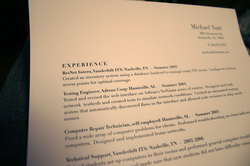
Now it appears that maybe history is repeating itself. And still no solution in sight!
Only 65,000 H-1B visas are available every fiscal year. Another 20,000 are available for graduates with US Master's degrees. Remember, an alien can only be counted against the quota once every 6 years, so the quota does not apply to extensions and transfers. There are also a fair number of cap-exempt H-1B's, usually when the employer is a university or affiliated with one.
To get an H-1B, an alien has to have a bachelor's degree or its equivalent. These are all smart, driven, professional people. And our policies put a quota not only on visa numbers, but on intelligence. Those aren't my words. Those are the words of Bill Gates.
According to a USCIS announcement on March 15, USCIS anticipates a great deal of filings, probably in excess of the 65,000 available. In response to this, USCIS is making a change in H-1B filing practice. Premium processing petitions (where you get a decision within 15 days for an extra $1,225 in filing fees) will now only be data-entered after April 15, 2013. You can still file your premium processing case as of April 1, but the 15 day clock won't start running until April 15. This is so that USCIS can data enter in all the regular processing H-1B petitions they're expecting the first two weeks of April. So basically, April 15 will be 'day 1'. (This means your case will not be delayed if you choose to premium process.)
If you file on Friday, March 29, 2013, the petition will arrive on Monday, April 1, 2013. They will hold all filings until Friday, April 5, 2013 and then count the filings. If the cap is not filled, then all cases will be receipted and no lottery will be held, but April 15 will be "day one" for premium processing filings.
If more than the allotted number arrives on or before April 5, 2013 then there will be a lottery. If past years are any indication, there will be two rounds. The first round will be for master's degree cases, and the second for the "losers" from the master's degree cases which will be tossed into the general lottery for the non-master's cases.
If you're on OPT, you might want to consider filing an H-1B now even if you're eligible for a STEM extension. If the lottery does take place, then this year may be your only chance - because if you take the OPT extension and there's another lottery situation next year, you might find yourself on a one-year unwanted vacation, or getting a degree you don't need. If your case gets rejected (ie, you lose the lottery) you may still have time to apply for an OPT extension. But if you don't try to change your status to H-1B, you're putting your entire future on the possibility that you'll win next year's lotto - but the difference is, you might not have an OPT extension to fall back on.
And if you can't find an employer - here is some helpful advice.







 RSS Feed
RSS Feed
